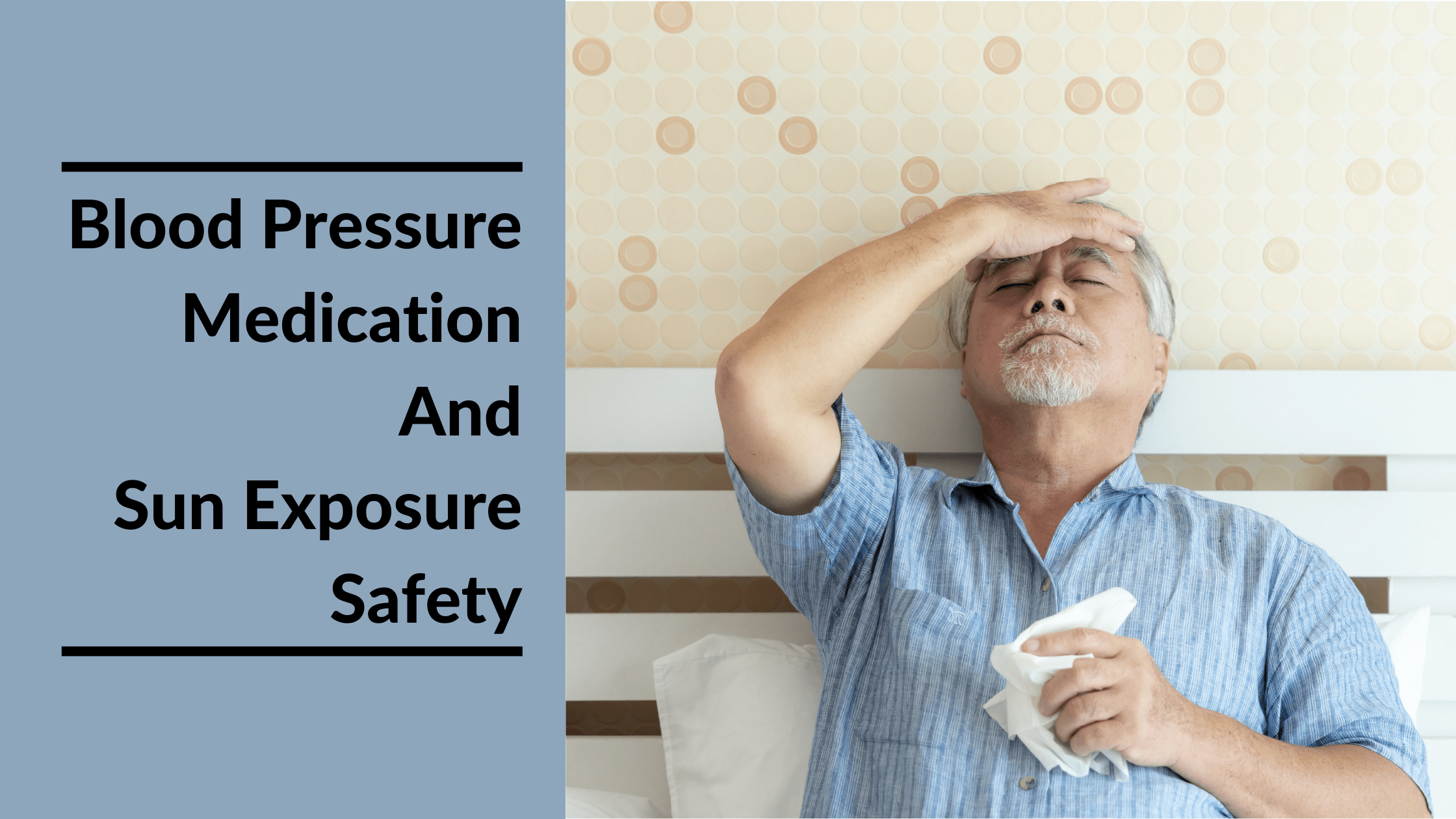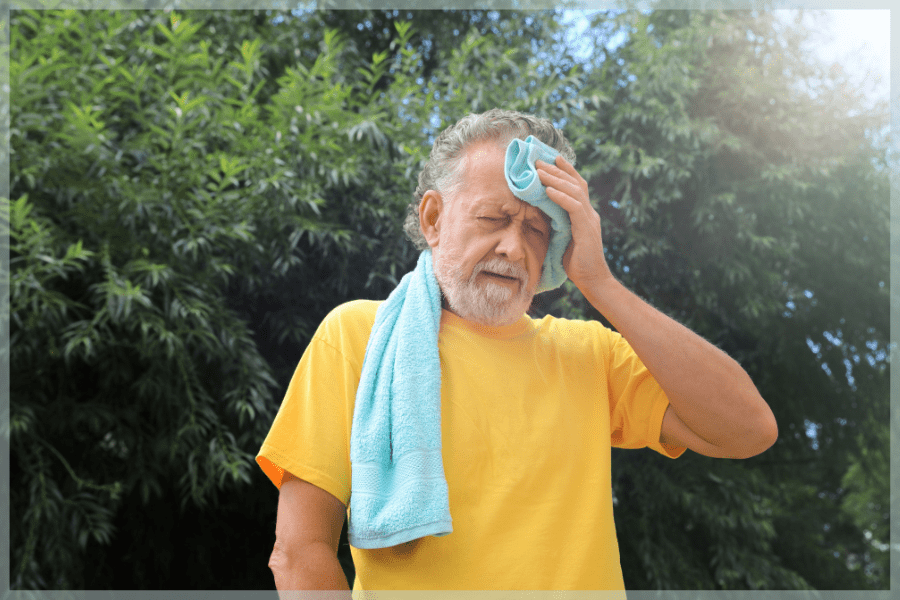
Blood pressure medication and sun exposure pose a big risk for older adults. Learn the risks and what you can do to stay safe and healthy throughout the summer.
Updated August 15, 2022
Blood Pressure Medication And Sun Exposure
It’s no secret that summer temperatures bring discomfort and health risks, especially for those more sensitive to heat. But for older adults, the combination of blood pressure medication and sun exposure can accelerate the harmful effects of heat intolerance.
Even moderate temperatures can increase the risk of high blood pressure medication and sun exposure. The first step to staying safe this summer is knowing when it’s safe to spend time outdoors. So when the mercury starts rising, it’s time to take a look at your prescriptions and talk to your doctor about any side effects that the heat can exasperate.
Understanding The Risk Of Humidity, Blood Pressure Medication, And Sun Exposure
A muggy day can make even a mild day feel hotter than it is, so keep an eye on the forecast when planning outings, shopping, and other outdoor activities. High humidity (70% or higher) impedes your ability to sweat, which is the body’s natural cooling process.
Additionally, humidity can also worsen cardiovascular problems and increase stroke risk. This is because heat and moisture accelerate blood flow to the skin, causing the heart to work harder. In turn, this raises blood pressure and makes it difficult for the body to regulate its internal temperature.
Furthermore, dehydration compounds these problems and makes it difficult for the heart to regulate the body’s internal temperature. So, stay hydrated throughout the summer, even when you don’t feel thirsty or stay indoors.
Who Does Humidity, Blood Pressure Medication, And Sun Exposure Affect Most?
Humidity and heat can be a danger to anyone, but some individuals are more susceptible to the harmful effects of a stifling summer day.
Risk factors include:
- People older than 50
- Those who are overweight
- A low-sodium diet
- Alcohol
- Health conditions affecting the heart, lungs, or kidneys
- Poor blood circulation
- Diuretics, sedatives, tranquilizers
There are two reasons why the combination of blood pressure medication and sun exposure can increase risk factors:

- First, some prescriptions already work to rid the body of fluids, whether sweat or urine. The addition of high temperatures causes the body to sweat even more, which increases the likelihood of dehydration.
- Secondly, blood pressure medication and sun exposure dilate blood vessels, which can cause a dip in blood pressure. In turn, this may make the prescription feel stronger.
However, don’t stop taking your medicine without talking to your doctor first. If you feel at risk for heat-related illness, drink plenty of water and try not to spend long periods outside.
What Are The Signs Of Heat Stress?
Heat-related illnesses can happen to anyone. Learn the signs and symptoms and can protect yourself and others throughout the summer from the dangers of blood pressure medication and sun exposure.
- Fluttering, quick pulse
- Headache
- Lethargy
- Profuse perspiration or a lack of sweat
- Cramping muscles
- Skin becomes clammy to the touch
- Swelling of the feet or ankles
- Urine appears dark
- Nausea
- Confusion or dizziness
If you begin to experience any of these symptoms, find an air-conditioned place or a shaded spot if you can’t go inside. Then, of course, drink lots of water or a sports drink to replenish electrolytes. If possible, take a cold bath or shower and rest afterward. Don’t hesitate to call a doctor if the condition does not improve.
How To Avoid The Effects Of Blood Pressure Medication And Sun Exposure
Seventy degrees may feel like the perfect day, but it’s also the threshold where heat-related problems can begin. Unfortunately, the risk factors that increase the effects of blood pressure medication and sun exposure are sometimes inevitable. But there are several precautions you can take to stay safe all summer long.
- Drink lots of water, even when you don’t feel thirsty.
- Avoid alcoholic beverages or drinks that have a lot of sugar.
- Remember to take periodic breaks indoors or in a shady place when outdoors.
- Don’t wear unnecessary clothing or clothes that are dark-colored or tight-fitting.
- Wear footwear and socks that don’t trap heat or lock in moisture.
- Avoid going outside between noon and 3 PM if possible.
Medications That Cause Heat Intolerance
Several types of medicines can increase heat sensitivity. Here are other prescriptions that can put someone at risk for heat-related illness:
- Allergy drugs (loratadine, promethazine)
- Muscle spasm drugs (atropine, scopolamine)
- Belladonna alkaloids
- Medications for mental illness (thioridazine, chlorpromazine, prochlorperazine)
- Tranquilizers (phenothiazines, butyrophenones, thioxanthenes)
- High blood pressure drugs (mecamylamine, beta-blockers)
- Migraine drugs (triptans)
- Ephedrine or pseudoephedrine (OTC decongestant, Sudafed)
- Cocaine
- Attention-Deficit Hyperactivity Disorder (ADHD) drugs (amphetamines)
MeetCaregivers Can Help
MeetCaregivers provide qualified professionals so you can receive the quality of life and well-being you deserve. Find a Caregiver today, or call +1(888) 541-1136 to chat one-on-one with a care coordinator.
Our Blog features dozens of articles about caregiver certification, aging in place, family caregiver support, and more.
